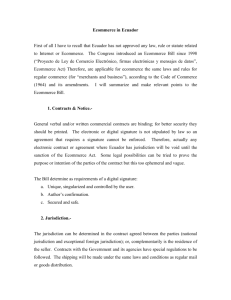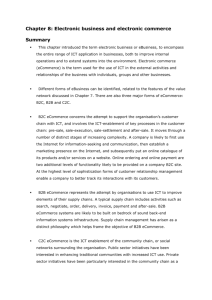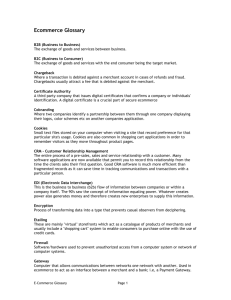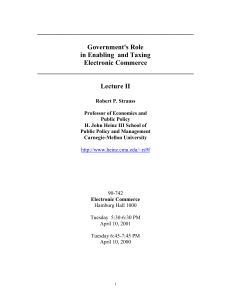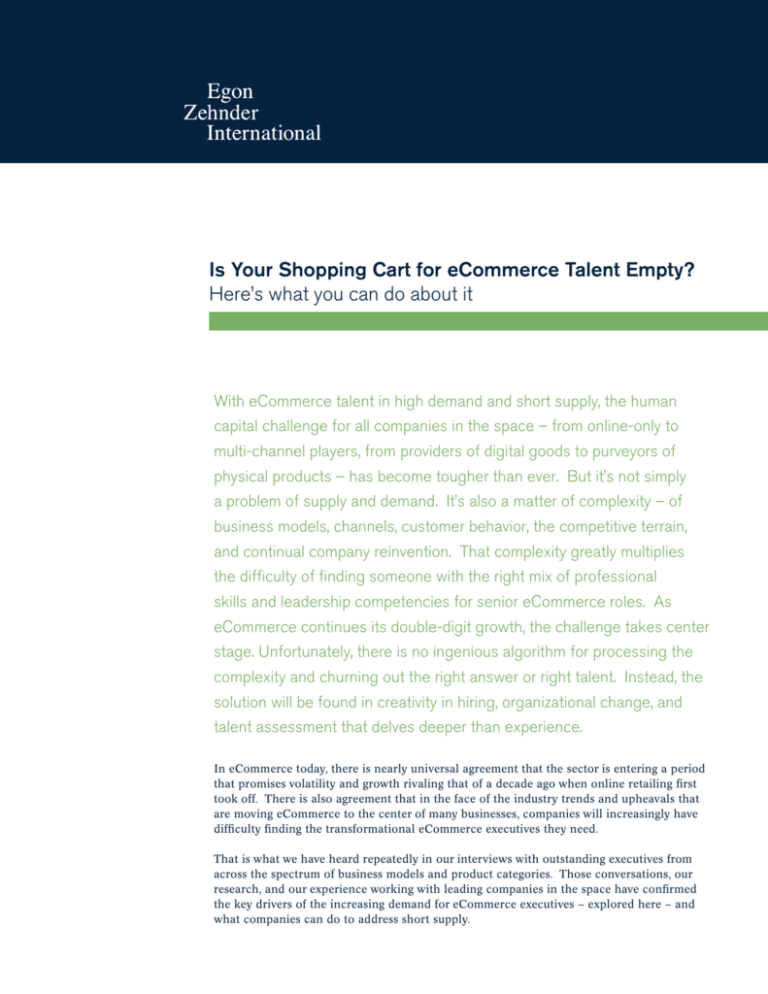
Is Your Shopping Cart for eCommerce Talent Empty?
Here’s what you can do about it
With eCommerce talent in high demand and short supply, the human
capital challenge for all companies in the space – from online-only to
multi-channel players, from providers of digital goods to purveyors of
physical products – has become tougher than ever. But it’s not simply
a problem of supply and demand. It’s also a matter of complexity – of
business models, channels, customer behavior, the competitive terrain,
and continual company reinvention. That complexity greatly multiplies
the difficulty of finding someone with the right mix of professional
skills and leadership competencies for senior eCommerce roles. As
eCommerce continues its double-digit growth, the challenge takes center
stage. Unfortunately, there is no ingenious algorithm for processing the
complexity and churning out the right answer or right talent. Instead, the
solution will be found in creativity in hiring, organizational change, and
talent assessment that delves deeper than experience.
In eCommerce today, there is nearly universal agreement that the sector is entering a period
that promises volatility and growth rivaling that of a decade ago when online retailing first
took off. There is also agreement that in the face of the industry trends and upheavals that
are moving eCommerce to the center of many businesses, companies will increasingly have
difficulty finding the transformational eCommerce executives they need.
That is what we have heard repeatedly in our interviews with outstanding executives from
across the spectrum of business models and product categories. Those conversations, our
research, and our experience working with leading companies in the space have confirmed
the key drivers of the increasing demand for eCommerce executives – explored here – and
what companies can do to address short supply.
Is Your Shopping Cart for eCommerce Talent Empty?
Multi-channel companies are competing with pure-plays for talented leaders who
can grow the increasingly lucrative online business.
From Drivers of Demand to Threats to Success
The high demand for eCommerce talent and the complexities of finding it are driven by five
key factors, each of which can threaten the position of companies that lack the right leaders
to address them:
Left Behind: The Economics of eCommerce. In 1999, when eCommerce was still in its
infancy, the then-CEO of Intel Andy Grove predicted that within a few years all companies
would be Internet companies. That prophecy has proved to be prescient. In 2000, one year
after he made the prediction, U.S. eCommerce sales totaled about $25 billion. In 2012,
according to Forrester Research, sales are expected to reach $226 billion, a growth rate of
12 percent over 2011. Meanwhile, growth in bricks and mortar retailing is stuck in the single
digits. Further, eCommerce doesn’t require the significant capital investments needed in
the bricks and mortar world, so margins are more generous. Faced with these compelling
economics, multi-channel companies are competing with pure-plays for talented leaders who
can grow the increasingly lucrative online business, do it faster, and satisfy shareholders.
Here, There, Everywhere: The Coming of Omni-Channel. Shifts in technology, changes in
consumer purchasing behavior, and declining in-store sales are ushering in the era of the
omni-channel. Traditionally, customers shopped in linear fashion in one or more of a
company’s channels. They bought online, or in the store, by mail, by phone from a catalogue,
or even from a direct salesforce. Now, however, smartphones, tablets, game consoles,
televisions, and other devices provide increased and ubiquitous Internet connectivity and
change the way many people shop.
“We’re now going through a complete reorganization. Why? Because ‘how do we
leverage Facebook’ is a question across the business.”
A single purchase decision now might involve the use of many channels. For example, a
customer might use her personal computer to compare prices online, a mobile phone in
a seller’s store to check store prices against the online prices of competitors’ products –
“showrooming,” as bricks and mortar retailers ruefully call it. She might even order the
competing product online right then and there. Or a shopping app with a GPS feature might
allow her to photograph the bar code of a product and then lead her a few hundred feet in the
mall, or a few blocks down the street, to a store with a better price or better product.
She might also have used social media like Facebook or Pinterest for advice from friends, or
she might have been drawn to the company’s social medium to make the purchase. Booz and
Company has predicted that online social network sales will reach $15 billion in volume by
2015 and mobile sales will account for $31 billion in annual sales. Says a digital leader of a
leading apparel maker, “We’re now going through a complete reorganization. Why? Because
‘how do we leverage Facebook’ is a question across the business.”
2
Egon Zehnder International
Is Your Shopping Cart for eCommerce Talent Empty?
As a result of these developments, savvy retailers are adopting business models in which all
channels are integrated in a way that makes the company’s products available anywhere,
on any device, and creates a consistent and compelling brand experience –in virtual and
physical stores alike. In fact, we are now seeing companies that were traditionally onlineonly recognize the value of physical stores as part of an omni-channel strategy. For example,
storefronts for Piperlime, Bonobos, Etsy, and others are popping up. Both online-only and
multi-channel players will need to find people who can help create a business model with a
unique value proposition in which all channels are part of a common strategy for profitable
growth – no easy task.
Fending off the threat of extinction that Amazon poses will require talent of an
exceptionally high order.
The 800-Pound Gorilla: Amazon. A great many of those shoppers showrooming in retail
stores likely go to the same online destination to compare prices: Amazon. Not too
many years ago, only bookstores worried about Amazon. Many independent stores went
under, and chains like Borders folded, while Barnes & Noble pivoted to fight it out online,
through its stores, and with e-readers. A similar shakeout hit consumer electronics, with
the disappearance of Circuit City, and the dramatic shrinking of Best Buy. Now, virtually
all retailers are competing against Amazon or looking over their shoulders in fear of the
giant, with its exceptional selection and service. For example, Bed, Bath & Beyond, the
home furnishings retailer, recently accelerated its investment in eCommerce in response to
Amazon’s launch of Casa.com and aggressive rollout of incentives to buy home goods online.
And it’s not just retailers – publishers, tablet makers, Internet infrastructure providers, and
data analytics companies are squaring off against Amazon. Almost any business could be next
– smartphones, online banking, logistics, and others. For all of these businesses, fending off
the threat of extinction that Amazon poses will require eCommerce talent of an exceptionally
high order.
Product Makers Take Control: Going Direct-to-Consumer. Manufacturers selling directly
to consumers online represent one of the fastest growing segments of eCommerce. Instead
of relying only on virtual or physical resellers, these manufacturers want to reap the many
benefits of a direct to consumer channel: control of the brand experience, acquisition of
valuable customer data, and higher margins. In effect, these manufacturers are fulfilling Andy
Grove’s prediction that all companies – not just retailers – will be Internet companies, and in
the process they are driving ever greater demand for eCommerce talent.
eCommerce talent is in demand on both sides of disruption: to create it with new
models and to outflank it in existing businesses.
3
Egon Zehnder International
Is Your Shopping Cart for eCommerce Talent Empty?
The Blindside: Disruptive Innovation. eCommerce itself has of course been one of the most
disruptive innovations in commercial history, upending ages-old business models and entire
industries. Within eCommerce, new models have appeared year after year – digital downloads
of media (iTunes, Netflix), social media (Facebook, Twitter), flash sales (Neiman Marcus MidDay Dash), daily deals (Zulily, Living Social), mobile apps (e-wallet, local commerce), and
more. Disruptive innovation can come from any direction: a giant like Apple transforming
the music business or from an edgy startup with a crafty idea that goes viral. As a result,
eCommerce talent is in demand on both sides of disruption: to create it with new models and
to outflank it in existing businesses.
Veterans of the many different varieties of eCommerce, with experience across
multiple business and operating models, are rare.
Limited Supply and Changing Career Trajectories
In any market, high demand often outstrips supply. In eCommerce, however, high demand
for talent is also running up against several factors that decidedly limit supply. Chief
among them: few opportunities yet for experience at scale. Fewer than 100 companies have
eCommerce revenues over $1 billion. That means that few have had experience leading
large-scale eCommerce operations. Further, because eCommerce is a relatively new sector,
veterans of the many different varieties of eCommerce, with experience across multiple
business and operating models, are rare.
In the meantime, as companies seek to address the complexity and the magnitude of limited
supply, the talent market has proven dynamic and volatile. Among the top internet retailers,
nearly 50% of the eCommerce leaders have been appointed in the past two years. Moreover,
the high majority of these appointments were in multi-channel companies, confirming the
increased focus and commitment to digital for traditional retailers.
The good news is that the industry today is incubating a generation of eCommerce / omnichannel leaders. But as in any tight talent market, the ease with which emerging talent can
move to other companies adds further volatility. As the former Vice President of eCommerce
at a top-20 Internet retailer told us, “eCommerce leaders need to be like college coaches,
where you know you’ll lose your talent in the next few years – not because they don’t like you,
but because it’s a dynamic market.”
How to Meet the Talent Challenge
Based on our conversations with top eCommerce executives and our experience working with
leading companies on eCommerce talent issues, we believe that there are at least four things
companies can do to address the volatility, complexity, and limited supply they face in the
eCommerce talent market:
4
Egon Zehnder International
Is Your Shopping Cart for eCommerce Talent Empty?
Think creatively about talent choices and the trade-offs they involve. For example, a multichannel retailer might decide to bring in a leader from an online-only player to help shake
up the culture of the company and bring an infusion of fresh ideas about what is possible
with digital commerce. The company might consider bringing in someone from an online
operation that sells only digital goods like streaming video, travel arrangements, virtual
auctions, or events tickets. Conversely, online-only players planning a move into physical
stores or an omni-channel strategy might well look to a leader with significant multi-channel
experience. In all of those cases, it is the candidate’s digital subject-matter expertise that
is sought, while it is often assumed that he or she can soon learn the company’s product
category and business.
Sixty percent of the new eCommerce leadership appointments in the past two
years come from outside the companies that hired them, with eighty percent
coming from outside the largest e-tailers, including many leaders without traditional
retail experience.
There are signs that eCommerce companies are beginning to think this way – and even going
farther afield for talent. Sixty percent of the new eCommerce leadership appointments in the
past two years come from outside the companies that hired them, with eighty percent coming
from outside the largest e-tailers, including many leaders without traditional retail experience.
These organizations therefore need to pay close attention to onboarding and change
management to enable the successful integration of this external talent.
The hiring developments of the past few years also suggest that the functional path to the top
eCommerce role is changing, with a decline of leaders with IT and technology backgrounds
and an increase in leaders with marketing backgrounds. The greatest number of recently
placed eCommerce executives bring marketing expertise, followed by strategist / general
managers, while fewer have risen from the IT or merchandising ranks.
“I wouldn’t start a job unless the CEO articulated and demonstrated his
commitment to the eCommerce effort.”
Consider the organizational factors that hinder the recruiting of top digital talent. One of the
most important of those factors with multi-channel companies is the commitment of the CEO
to eCommerce and its importance for the future of the company. While voicing commitment
is easy, actually walking the talk requires diplomacy, deft leadership, an empowerment of
others, and the adaptability to rethink the business model and customer proposition. Says the
Senior Vice President and General Manager at a multi-channel media company, “I wouldn’t
start a job unless the CEO articulated his commitment to the eCommerce effort. Without
that support, there’s a potential for a lot of politics to occur. People in the traditional retail
business will view the efforts with concern and scepticism; and if you’re viewed as a threat,
there will be no cooperation.”
5
Egon Zehnder International
Is Your Shopping Cart for eCommerce Talent Empty?
“You need to create a buffer that makes it okay to break rules, okay to fail – more
of an R&D than a production environment.”
Reporting structures can send a powerful signal of CEO commitment. eCommerce leaders
almost universally agree that reporting directly to the CEO is essential for digital success.
Says the Vice President of eCommerce at a leading apparel company, “I would never take a
job that didn’t report directly to the CEO, because otherwise there are too many people in the
way with different agendas.” While we do see many eCommerce leaders reporting to the top
executive, we also often see them embedded one level deeper in the organization – as a line
to Sales, suggesting the perceived value of the business as a channel, or as a line to Marketing,
suggesting it as a brand extension and acquisition tool. Some organizations who have not
(yet) structured the role as a direct report to the CEO still offer the digital leader a seat at the
Executive Committee table.
Company culture may also play a significant role in a talented eCommerce executive’s career
decisions. Entrepreneurial talent, especially those from online-only companies, may hesitate
to join a big traditional company undergoing digital transformation, fearing that they will be
hamstrung in their efforts by slow-moving bureaucratic structures and risk-averse colleagues.
As one eCommerce leader said, “You need to create a buffer that makes it okay to break rules,
okay to fail – more of an R&D than a production environment.” Another top e-tail leader
has infused a new mantra – “progress not perfection” – in his multi-channel organization to
encourage the organization to prioritize speed and encourage experimentation.
Look for the right competencies in eCommerce leaders. The baseline functional
competencies that virtually any eCommerce leader needs are domain expertise and data
orientation. One must know the mechanics, tools, and levers to drive value in eCommerce
as well as have an appetite for learning and the savvy to stay abreast of this rapidly evolving
space; after all, the iPhone only recently celebrated its 5th birthday! “You can’t be a
dilettante coming into eCommerce without knowing the web,” says an eCommerce leader who
has served as a change agent in multi-channel businesses. “The Internet is a profession – you
need domain knowledge.” Data expertise includes comfort with the data and analytics that
drive so many critical strategic and tactical decisions in eCommerce and a thirst for customer
insights that data can yield. After all, in digital commerce, all things can be measured and
most things should be.
Those baseline competencies must be complemented by leadership competencies. In the
past five years Egon Zehnder International has conducted more than 25,000 appraisals of VP,
SVP, and C-level talent and their external benchmarks. These appraisals provide a wealth
of insight into the critical leadership competencies required to succeed with the kind of
transformative strategies needed to win in eCommerce. The leadership competencies that are
critical for eCommerce include:
6
Egon Zehnder International
Is Your Shopping Cart for eCommerce Talent Empty?
• Collaboration and influencing. Because eCommerce markets and competition are
so dynamic and evolve so rapidly, eCommerce leaders must be able to enlist the
cooperation of colleagues to move fast and take bold action. In multi-channel
companies that are elevating the profile of eCommerce, the leader must also be able to
handle with tact and delicacy the tensions that such transformations can generate with
other functions. That often means collaborating with and influencing senior leaders
outside the function over whom the eCommerce leader may have no direct authority.
Leaders who excel at collaboration and influencing know how to use informal
structures and networks to get things done; they know how to communicate and create
a shared vision, and they are widely respected throughout the organization.
• Change Leadership. Winning in the fast-paced, constantly evolving eCommerce space
requires the ability to quickly adopt new ways of doing things and get other people to
adopt them as well. The leader must be adaptable and flexible, responsive to market
feedback, and eager to learn quickly. The best such eCommerce leaders create a
learning culture that can test and try new approaches, tolerate occasional failure, and
continually adapt to change.
• Results orientation. “In eCommerce, it’s about your ability to deliver – and deliver
every day,” says the one of the world’s most successful multi-channel merchandisers.
Outstanding eCommerce leaders have the ability to rapidly translate strategic
objectives into concrete and targeted actions that yield rapid results. They track
success based on clear metrics, and they have the ability to quickly take corrective
action if performance falls short of expectations. They also invest the time to
communicate what success and its underlying drivers look like and then put in place
the processes and measures that take the organization there.
Assess talent for potential. In recruiting (and in many other talent appraisals), organizations
too often base their judgments on the individual’s past experience and on present
performance. Both of those criteria are important. But giving experience and performance
undue weight overlooks one of the most important predictors of success – potential. Defined
as the capacity to take on leadership roles that are greater in both size and complexity, and
the speed with which someone can do so, potential is particularly relevant in eCommerce,
which moves at a swift pace, enlarging and complicating the role of the leader along the way.
Giving experience and performance undue weight overlooks one of the most
important predictors of success – potential.
In the course of developing a new model of executive potential, a high-level team from our
firm found that most models of potential use performance as their primary measure. As a
result, potential is typically defined in terms of short-term promotability rather than longterm developmental capacity. After exhaustive research, testing, and validation, the team
developed and began successfully applying a model that maintains a sharp distinction
between short-term promotability and long-term potential. In this deeper and longer-term
view, executive potential is gauged by assessing the degree to which an individual possesses
the five traits that predict the development of executive ability:
7
Egon Zehnder International
Is Your Shopping Cart for eCommerce Talent Empty?
1. Curiosity – Seeking out new experiences, ideas, knowledge; seeking feedback and learning
new things in order to change
2. Insight – Proactively gathering and making sense of a vast range of information from a
wide range of sources, and discovering new insights that, when applied, transform past
views or set new directions
3. Engagement – Deeply engaging others, communicating a persuasive vision, and inspiring
genuine emotional connection of individuals to the organization and the leader
4. Determination – Managing and maintaining long-term, sustained effort and focus despite
obstacles and distractions, while not ignoring evidence that the nature of the activity
should change
5. Motivation – Being energized and engaged on an emotional level with the work of
leadership.
Taken together, these attributes provide a portrait of the ideal eCommerce leader. Companies
that assess for these traits in both internal and external candidates for top eCommerce roles
will not only have a better grasp of the real capacity of the leader, but also might discover a
viable candidate who might otherwise have been overlooked.
Conclusion
As the Vice President of a highly successful beauty products company eloquently puts it:
“eCommerce is a hybrid of the right and left brain. It’s still retail but it’s technology-driven
retail. So you have to embrace analytics and you have to understand the passion side of
retail. You have to live in both worlds – work with creatives on the emotional expression of
the brand and then pull in the technology and not only make it run, but make it sing.”
That’s a high bar. The war for such talent in the near term will be won by companies that
can think creatively about hiring, remove organizational obstacles, identify leaders with the
right competencies, and probe for potential. But these companies will also better position
themselves for long-term success. They will be prepared to take full advantage of the abilities
of the next generation of extraordinary talent that is being developed today. They will be able
to grow and promote talent from within, as well as attract it from outside. And they will build
organizations that are keenly responsive to the art and the science of eCommerce – and make
it sing.
Lindsay Trout
Egon Zehnder International
Palo Alto
lindsay.trout@ezi.net
+1 650 847 3065
8
Emily Krehbiel
Egon Zehnder International
Research Analyst
Egon Zehnder International
Amsterdam
Athens
Atlanta
Bangalore
Barcelona
Beijing
Berlin
Bogotá
Boston
Brussels
Budapest
Buenos Aires
Calgary
Chicago
Copenhagen
Dallas
Dubai
Düsseldorf
Frankfurt
Geneva
Hamburg
Helsinki
Hong Kong
Houston
Istanbul
Jakarta
Jeddah
Johannesburg
Kuala Lumpur
Lisbon
London
Los Angeles
Luxembourg
Lyon
Madrid
Melbourne
Mexico
Miami
Milan
Montreal
Moscow
Mumbai
Munich
New Delhi
New York
Oslo
Palo Alto
Paris
Prague
Rio de Janeiro
Rome
San Francisco
Santiago
São Paulo
Seoul
Shanghai
Singapore
Stuttgart
Sydney
Tel Aviv
Tokyo
Toronto
Vienna
Warsaw
Zurich
Egon Zehnder International is the world’s leading
privately owned search firm with over 420
consultants working in 65 offices in 39 countries.
The firm specializes in senior level executive search,
board consulting and director search, management
and team appraisals, and leadership development.
© 2012 Egon Zehnder International
All rights reserved.
No part of this publication may be reproduced, stored
in retrieval system or transmitted in any form or by
any means, electronic, mechanical, photocopying,
recording or otherwise without the prior permission of
Egon Zehnder International


